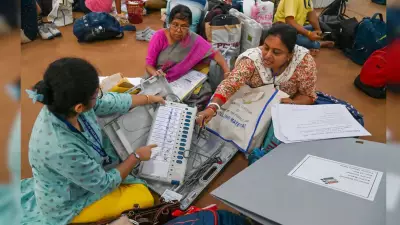
Despite another election cycle passing by, the hope for reviving the once-thriving copper mines in Ghatshila's tribal constituencies remains distant, leaving local communities in economic despair and forcing migration to other cities.
Decades of Economic Neglect
Patrick D'Souza, who now works at a star hotel in Gurgaon after graduating from Mumbai, expressed his disappointment after casting his vote at the Shivlal High School polling booth. Having completed his education at a private missionary school in Musaboni, Patrick represents one of many Anglo-Indian families who settled in the twin copper townships of Musaboni and Moubhandar.
The mines were shut down in December 1997 during undivided Bihar's administration, forcing numerous Anglo-Indian families to migrate to different parts of the country or abroad in search of livelihood.
"Built in 1928, Musaboni was once a sprawling town," Patrick recalled with nostalgia. "But the British government residential area has slowly transformed into ghost colonies with abandoned quarters."
Political Promises Remain Unfulfilled
Patrick highlighted the prolonged neglect, stating that even after 25 years of Jharkhand's formation, no political party or candidate has taken concrete steps to reopen the copper mines. These mines were historically significant, not just for copper but for yielding gold as a by-product, making them the economic backbone of Ghatshila.
Echoing similar concerns, 22-year-old Jhuma Rao shared her educational challenges. After completing schooling from Kendriya Vidyalaya in Surda, she had to relocate to Delhi for graduation because Ghatshila college offers limited courses and suffers from inadequate teaching staff across departments.
Rao, who voted at the KV polling booth, revealed her family's economic struggles. "My father runs a grocery shop in Moubhandar, but sales are very poor because people living nearby are economically downtrodden due to lack of employment opportunities."
Youth Exodus and Healthcare Deficiencies
The economic stagnation has created a domino effect on the region's development. Rao confirmed her plans to take her family with her to wherever she finds employment, highlighting the area's limited future prospects.
Healthcare infrastructure remains another critical concern. The nearest hospital providing comprehensive treatment is located in Jamshedpur, creating accessibility issues for local residents during medical emergencies.
First-time tribal voter Mani Hembrom expressed his disillusionment with the political process. He noted that during campaign rallies for the bypolls, no candidate from any political alliance presented any concrete blueprint addressing employment, education, or healthcare improvements in Ghatshila.
This absence of substantial development plans led Hembrom to choose the NOTA (None Of The Above) option, reflecting the growing frustration among young voters with unfulfilled political promises.





